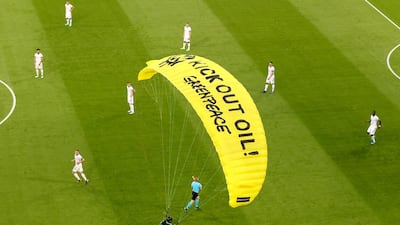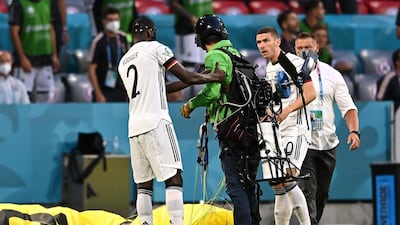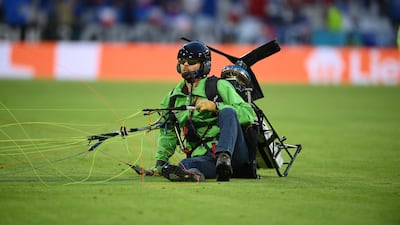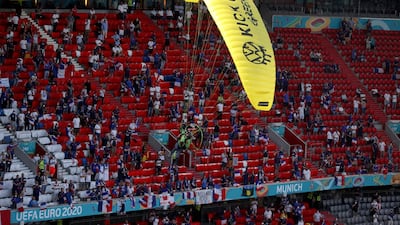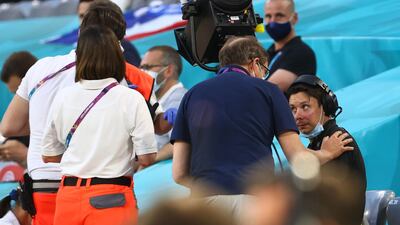Environmental campaign group Greenpeace has apologised after its protest stunt at the Germany-France Euros 2020 match went wrong and two people were injured.
A powered paraglider lost control as the pilot tried to make an emergency landing on the pitch, hitting overhead camera wires attached to the roof.
He careened a few metres from the heads of spectators before landing badly on the Bayern Munich field. Debris fell on the turf and main grandstand, narrowly missing France coach Didier Deschamps at pitch side.
German officials said the paraglider was in the crosshairs of police snipers as he landed and could have been killed.
“The snipers already had him in their sights,” said Bavaria’s interior minister Joachim Herrmann.
“If the police had come to the conclusion that it was a terrorist attack, he would have paid for it with his life.”
Only the large Greenpeace logo emblazoned on the yellow canopy of the parachute microlight saved him, he said.
Greenpeace spokesperson Benjamin Stephan apologised for the botched protest and the injuries caused, saying that the plan had been to fly over the stadium and not to land in it.
“The paraglider didn’t want to go into the stadium yesterday. The pilot wanted to fly over the stadium while maintaining the necessary safety distance and only let a balloon float into the stadium with a message to Volkswagen, a main sponsor, with the demand that they get out of the production of climate-damaging diesel and gasoline engines quicker,” Mr Stephan said.
“There was a technical problem during the flight over. The hand throttle of the electric para motor failed, and because there was no more thrust, the glider suddenly lost height.”
He said the pilot had no option but to make an emergency landing on the field after striking the steel cables attached to the stadium’s roof.
The paraglider had a large yellow parachute with the Greenpeace name on it and the message: "KICK OUT OIL!"
A spokesman for German Chancellor Angela Merkel criticised the Greenpeace stunt and said those behind it should reflect on what had happened.
“This was an irresponsible action that put people in great danger,” Steffen Seibert said.
It was a relief nothing more serious had happened, he said.
He said the group should “critically reflect on the purpose of such actions, which are about maximum spectacle for maximum PR-effect”.
Police spokesman Andreas Franken said the two men who were hurt both sustained light head injuries and have been discharged from hospital. They had been working at the game.
Security measures will be toughened for Saturday’s match between Germany and Portugal.
One in nine do not have enough to eat
Created in 1961, the World Food Programme is pledged to fight hunger worldwide as well as providing emergency food assistance in a crisis.
One of the organisation’s goals is the Zero Hunger Pledge, adopted by the international community in 2015 as one of the 17 Sustainable Goals for Sustainable Development, to end world hunger by 2030.
The WFP, a branch of the United Nations, is funded by voluntary donations from governments, businesses and private donations.
Almost two thirds of its operations currently take place in conflict zones, where it is calculated that people are more than three times likely to suffer from malnutrition than in peaceful countries.
It is currently estimated that one in nine people globally do not have enough to eat.
On any one day, the WFP estimates that it has 5,000 lorries, 20 ships and 70 aircraft on the move.
Outside emergencies, the WFP provides school meals to up to 25 million children in 63 countries, while working with communities to improve nutrition. Where possible, it buys supplies from developing countries to cut down transport cost and boost local economies.
Genesis G80 2020 5.0-litre Royal Specs
Engine: 5-litre V8
Gearbox: eight-speed automatic
Power: 420hp
Torque: 505Nm
Fuel economy, combined: 12.4L/100km
Price: Dh260,500
Who has lived at The Bishops Avenue?
- George Sainsbury of the supermarket dynasty, sugar magnate William Park Lyle and actress Dame Gracie Fields were residents in the 1930s when the street was only known as ‘Millionaires’ Row’.
- Then came the international super rich, including the last king of Greece, Constantine II, the Sultan of Brunei and Indian steel magnate Lakshmi Mittal who was at one point ranked the third richest person in the world.
- Turkish tycoon Halis Torprak sold his mansion for £50m in 2008 after spending just two days there. The House of Saud sold 10 properties on the road in 2013 for almost £80m.
- Other residents have included Iraqi businessman Nemir Kirdar, singer Ariana Grande, holiday camp impresario Sir Billy Butlin, businessman Asil Nadir, Paul McCartney’s former wife Heather Mills.
Hunting park to luxury living
- Land was originally the Bishop of London's hunting park, hence the name
- The road was laid out in the mid 19th Century, meandering through woodland and farmland
- Its earliest houses at the turn of the 20th Century were substantial detached properties with extensive grounds
The more serious side of specialty coffee
While the taste of beans and freshness of roast is paramount to the specialty coffee scene, so is sustainability and workers’ rights.
The bulk of genuine specialty coffee companies aim to improve on these elements in every stage of production via direct relationships with farmers. For instance, Mokha 1450 on Al Wasl Road strives to work predominantly with women-owned and -operated coffee organisations, including female farmers in the Sabree mountains of Yemen.
Because, as the boutique’s owner, Garfield Kerr, points out: “women represent over 90 per cent of the coffee value chain, but are woefully underrepresented in less than 10 per cent of ownership and management throughout the global coffee industry.”
One of the UAE’s largest suppliers of green (meaning not-yet-roasted) beans, Raw Coffee, is a founding member of the Partnership of Gender Equity, which aims to empower female coffee farmers and harvesters.
Also, globally, many companies have found the perfect way to recycle old coffee grounds: they create the perfect fertile soil in which to grow mushrooms.
